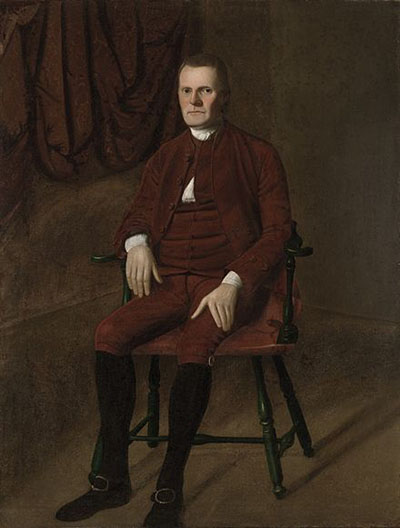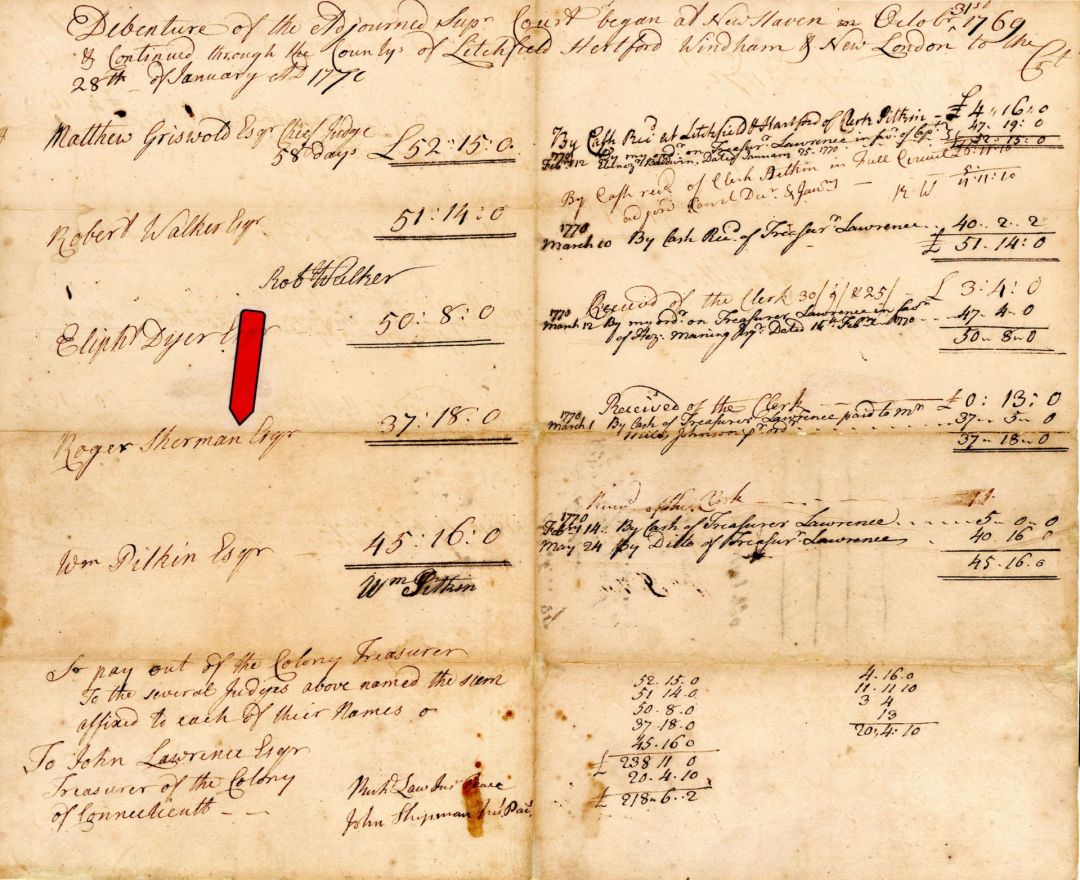1770 Debenture Listing Roger Sherman and William Pitkin- Autographs
Inv# AU1770 AutographDebenture of the court of New Haven, Connecticut listing the names of Roger Sherman and Wm. Pitkin, but not signed. Large document measures 15" x 12".

Roger Sherman (April 19, 1721 – July 23, 1793) was an early American statesman, lawyer, and a Founding Father of the United States. He is the only person to sign all four great state papers of the United States: the Continental Association, the Declaration of Independence, the Articles of Confederation, and the Constitution. He also signed the 1774 Petition to the King.
Born in Newton, Massachusetts Sherman established a legal career in Litchfield County, Connecticut, despite a lack of formal education. After a period in the Connecticut House of Representatives, he served as a justice of the Superior Court of Connecticut from 1766 to 1789. He represented Connecticut at the Continental Congress, and he was a member of the Committee of Five that drafted the Declaration of Independence.
Sherman served as a delegate to the 1787 Philadelphia Convention, which produced the United States Constitution. After Benjamin Franklin, he was the second oldest delegate present at the convention. Sherman favored granting the federal government power to raise revenue and regulate commerce, but initially opposed efforts to supplant the Articles of Confederation with a new constitution. After supporting the establishment of a new constitution, Sherman became a key delegate and main opponent of James Madison's Virginia Plan by introducing the Connecticut Compromise that won the approval of both the more and less populous states.
After the ratification of the Constitution, Sherman represented Connecticut in the United States House of Representatives from 1789 to 1791. He served in the United States Senate from 1791 to his death in 1793.
William Pitkin (April 30, 1694 – October 1, 1769) was a colonial governor of the Connecticut Colony.
Pitkin was born to a politically prominent family in Hartford (Now East Hartford) in 1694. His grandfather was William Pitkin IV, attorney general of Connecticut. and negotiating commissioner to Gov. Benjamin Fletcher of New York. Through his grandaunt Martha, he was a cousin of deputy governor Roger Wolcott, Founding Father Oliver Wolcott, and Gov. Oliver Wolcott Jr., who succeeded Hamilton as Secretary of the Treasury.
He married Mary Woodbridge on May 7, 1724, and had five children, William, Timothy, George, Epraphas, and Ashebel; one of whom, William IV, was elected a member of the US Congress.
Pitkin was first elected to the colonial assembly in 1728, where he served through 1734, the last two years as speaker of the house. He was a member or the Council of Assistants from 1734 to 1754. He was Captain of the Trainband, East Society from 1730 to 1738; Major of the 1st Regiment from 1738 to 1739; and Colonel of the 1st Regiment from 1739 to 1754. He was also active in the colonial militia, raising troops in East Hartford for an expedition to the Spanish West Indies during the War of Jenkins' Ear in 1740.
In 1735 Pitkin was elected county judge, and in 1741 he became a superior court judge, a post he would hold until he was elected governor in 1766. In 1754 he was also elected deputy governor, serving under Thomas Fitch, and as Chief Justice, Connecticut Superior Court, an office tied to the deputy governorship.
Fitch's attempts to implement the unpopular Stamp Act may have led to Pitkin's election ahead of Fitch in the 1766 election. Pitkin was opposed to the Stamp Act and other attempts by the British Parliament to tax the colonies, and he served as governor from 1766 to 1769.











Ebay ID: labarre_galleries